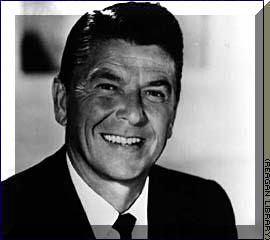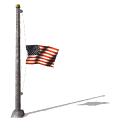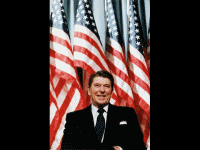

REMEMBERING

RONALD WILSON REAGAN
![]()
'Morning Again in America'
BY PETER ROBINSON
Sunday, June 13, 2004 12:01 a.m. EDT
Thanks to Reagan's optimism, the sun set on the Soviet empire.
One day in 1977 Ronald Reagan asked Richard Allen, who would become his first national security adviser, if Mr. Allen would like to hear his theory of the Cold War.
"Some people think I'm simplistic," Mr. Reagan said, "but there's a difference between being simplistic and being simple. My theory of the Cold War is that we win and they lose. What do you think about that?"
"I was flabbergasted," Mr. Allen now says. "I'd worked for Nixon and Goldwater and many others, and I'd heard a lot about . . . détente and the need to 'manage the Cold War,' but never did I hear a leading politician put the goal so starkly.
" 'Governor,' I asked, 'do you mean that?'
"Mr. Reagan replied, 'Of course I mean it. I just said it.' "
Yes, I know Conservatives may credit the 40th chief executive with victory in the Cold War.
Margaret Thatcher has often said that "Ronald Reagan won the Cold War without firing a single shot".
But the view is hardly universal.
Well, then. If Ronald Reagan didn't win the Cold War, how did the conflict end? The alternative explanation holds that the Soviet Union simply collapsed, falling in on itself because of economic stagnation, imperial overreach--that is, an empire that had grown so big the Soviets could no longer afford it--and the rise of a generation that failed to share the communist faith of its parents and grandparents.
Ronald Reagan? Don't be silly. He had nothing to do with it.
Or had he?
The Soviet Union certainly did suffer from economic stagnation. But its economy had been growing feebly since at least the early '70s.
What changed during the '80s wasn't so much the economy of the U.S.S.R. as the economy of the U.S., which responded to the policies of Mr. Reagan by growing dramatically.
By the time he left office, American output had expanded by an amount nearly equal to the entire economy of what was then West Germany. The only way the Soviets could have expanded their economy by that amount would have been by annexing West Germany itself. If the Soviets finally decided they'd had it with the creaking, backward economic contraption that Stalin, Khrushchev and Brezhnev had given them, it was because they'd caught a glimpse of the sleek new beauty that Ronald Reagan had given us.
Imperial overreach? True enough, the Soviets found themselves stuck with an empire they could no longer afford. But you can hardly blame them. By rebuilding our military, Mr. Reagan had forced the Soviets to spend more on theirs. By arming the contras in Nicaragua and the mujahideen in Afghanistan, he had compelled the Soviets and their proxies to engage in long, expensive wars of attrition merely to cling to territory they'd already come to think of as their own. By supporting the dissident movement in Eastern Europe--Mr. Reagan provided funding and equipment to Solidarity, to name just one example--he had transformed the Warsaw Pact from an asset into a liability.
And by launching the Strategic Defense Initiative, he had confronted the Soviets with the need to make massive new investments in their nuclear arsenal. "We didn't have to build a complete version of SDI to make their calculations difficult," Henry Kissinger says. "If the Soviets no longer knew how many missiles would get through, then they might have had to launch hundreds more to have had a chance of success. You can see why SDI had them so rattled." The Soviet case of imperial overreach came courtesy of Ronald Reagan.
Did a new generation of Russians refuse to place its faith in the Communism of their forebears? Evidently. But why? In part, surely, because of the transformation young Russians saw taking place in the United States.
During the '70s, the U.S. looked like a nation in decline, just about as Karl Marx would have predicted.
"The symptoms of . . . [a] crisis in the American spirit are all around us," President Carter said in an address from the Oval Office on July 15, 1979.
Then, in 1981, Ronald Reagan took office. "The crisis we are facing today," he said in his first inaugural address, requires "our willingness to believe in ourselves and to believe in our capacity to perform great deeds. . . . And after all, why shouldn't we believe that? We are Americans."
The American people responded with renewed patriotism and self-confidence. "Morning Again in America," the campaign slogan for Mr. Reagan's 1984 re-election campaign, may have been derided in the media, but it captured the mood of the nation that returned him to office by 49 out of 50 states.
Morning again in America? As the children of the Soviet apparatus would have noticed, that wasn't in Marx's game plan.
Mr. Reagan made communism look a lot less like the wave of the future and a lot more like other misbegotten 19th-century ideologies, such as syndicalism or anarchism, destined for the ash heap of history.
"The great man or woman in history," Sidney Hook argues in his book, "The Hero in History," is "someone of whom we can say . . . that if they had not lived when they did, or acted as they did, the history of their countries and of the world . . . would have been profoundly different."
Does Reagan fit the description?
He does.
No one else would have done what he did. And what he did changed the world.
"He was an authentic person and a great person," Mikhail Gorbachev said in an interview not long ago. "If someone else had been in his place, I don't know if what happened would have happened."
There you have Ronald Reagan's principal adversary all but admitting it.
The man we laid to rest at sunset on Friday June 11, 2004
was a hero.


![]()
June 5, 2004
![]()
1964
Given as a stump speech, at speaking engagements, and on a memorable night in 1964 in support of Barry Goldwater's presidential campaign. This version is from that broadcast.

I am going to talk of controversial things. I make no apology for this.
It's time we asked ourselves if we still know the freedoms intended for us by the Founding Fathers. James Madison said, "We base all our experiments on the capacity of mankind for self government."
This idea -- that government was beholden to the people, that it had no other source of power -- is still the newest, most unique idea in all the long history of man's relation to man. This is the issue of this election: Whether we believe in our capacity for self-government or whether we abandon the American Revolution and confess that a little intellectual elite in a far-distant capital can plan our lives for us better than we can plan them ourselves.
You and I are told we must choose between a left or right, but I suggest there is no such thing as a left or right. There is only an up or down. Up to man's age-old dream--the maximum of individual freedom consistent with order -- or down to the ant heap of totalitarianism. Regardless of their sincerity, their humanitarian motives, those who would sacrifice freedom for security have embarked on this downward path. Plutarch warned, "The real destroyer of the liberties of the people is he who spreads among them bounties, donations and benefits."
The Founding Fathers knew a government can't control the economy without controlling people. And they knew when a government sets out to do that, it must use force and coercion to achieve its purpose.
So we have come to a time for choosing.
Public servants say, always with the best of intentions, "What greater service we could render if only we had a little more money and a little more power." But the truth is that outside of its legitimate function, government does nothing as well or as economically as the private sector.
Yet any time you and I question the schemes of the do-gooders, we're denounced as being opposed to their humanitarian goals. It seems impossible to legitimately debate their solutions with the assumption that all of us share the desire to help the less fortunate. They tell us we're always "against," never "for" anything.
We are for a provision that destitution should not follow unemployment by reason of old age, and to that end we have accepted Social Security as a step toward meeting the problem. However, we are against those entrusted with this program when they practice deception regarding its fiscal shortcomings, when they charge that any criticism of the program means that we want to end payments....
We are for aiding our allies by sharing our material blessings with nations which share our fundamental beliefs, but we are against doling out money government to government, creating bureaucracy, if not socialism, all over the world.
We need true tax reform that will at least make a start toward restoring for our children the American Dream that wealth is denied to no one, that each individual has the right to fly as high as his strength and ability will take him.... But we cannot have such reform while our tax policy is engineered by people who view the tax as a means of achieving changes in our social structure....
Have we the courage and the will to face up to the immorality and discrimination of the progressive tax, and demand a return to traditional proportionate taxation? . . . Today in our country the tax collector's share is 37 cents of every dollar earned. Freedom has never been so fragile, so close to slipping from our grasp.
Are you willing to spend time studying the issues, making yourself aware, and then conveying that information to family and friends? Will you resist the temptation to get a government handout for your community? Realize that the doctor's fight against socialized medicine is your fight. We can't socialize the doctors without socializing the patients. Recognize that government invasion of public power is eventually an assault upon your own business. If some among you fear taking a stand because you are afraid of reprisals from customers, clients, or even government, recognize that you are just feeding the crocodile hoping he'll eat you last.
If all of this seems like a great deal of trouble, think what's at stake.
We are faced with the most evil enemy mankind has known in his long climb from the swamp to the stars. There can be no security anywhere in the free world if there is no fiscal and economic stability within the United States. Those who ask us to trade our freedom for the soup kitchen of the welfare state are architects of a policy of accommodation.
They say the world has become too complex for simple answers.
They are wrong. There are no easy answers, but there are simple answers. We must have the courage to do what we know is morally right. Winston Churchill said that "the destiny of man is not measured by material computation. When great forces are on the move in the world, we learn we are spirits--not animals." And he said, "There is something going on in time and space, and beyond time and space, which, whether we like it or not, spells duty."
You and I have a rendezvous with destiny. We will preserve for our children this, the last best hope of man on earth, or we will sentence them to take the first step into a thousand years of darkness.
If we fail, at least let our children and our children's children say of us we justified our brief moment here. We did all that could be done.
![]()
MAY HIS SHINING CITY ON A HILL QUICKLY BECOME OUR REALITY.
IN HIS HEAVENLY HOME, MAY THIS PRESIDENT KNOW THAT HE HAS AMERICA'S ETERNAL GRATITUDE AND OUR LOVE AND RESPECT.
![]()
Lois J Crawford
June 2004
![]()
Addendum:
On 6 May 1982, Ronald Reagan offered these words: “Today, prayer is still a powerful force in America, and our faith in God is a mighty source of strength. Our Pledge of Allegiance states that we are ‘one nation under God,’ and our currency bears the motto, ‘In God We Trust.’ The morality and values such faith implies are deeply embedded in our national character. Our country embraces those principles by design, and we abandon them at our peril. Yet in recent years, well-meaning Americans in the name of freedom have taken freedom away. For the sake of religious tolerance, they’ve forbidden religious practice in the classrooms. The law of this land has effectively removed prayer from our classrooms. How can we hope to retain our freedom through the generations if we fail to teach our young that our liberty springs from an abiding faith in our Creator?
![]()
6-5-05 From the Federalist Patriot....
On Sunday, 5 June, we observed the first anniversary of the death of President Ronald Reagan. His passing was a bittersweet event for all American Patriots, especially those of us who knew him and were honored to be mentored by him. Though he is now in the company of Patriots in the most shining city of all, his spirit and legacy in this life are eternal. As noted in our Mission statement, The Federalist Patriot was founded in honor of President Reagan. Indeed, as noted by his son Michael Reagan, "The vision and legacy of the Reagan Revolution flourish on the pages of The Federalist Patriot."
To read The Patriot's
tribute to our mentor, link to "The
Twilight's Last Gleaming" at --
http://Reagan2020.US/tributes/Alexander.asp
Additionally, The Patriot developed the most comprehensive resource on, and tribute to, Ronald Reagan. Visit Reagan 20/20 -- http://Reagan2020.US/
God bless Ronald Reagan! "Well done, thou good and faithful servant...."
This edition is dedicated in his honor.

Lois J Crawford
2008
![]()
